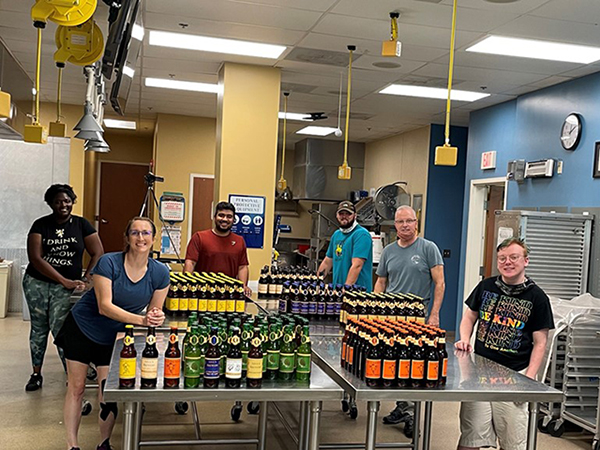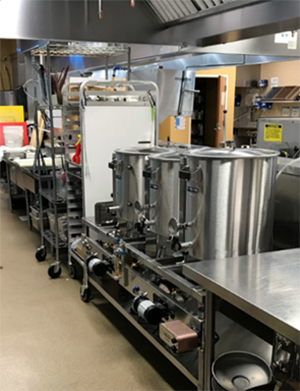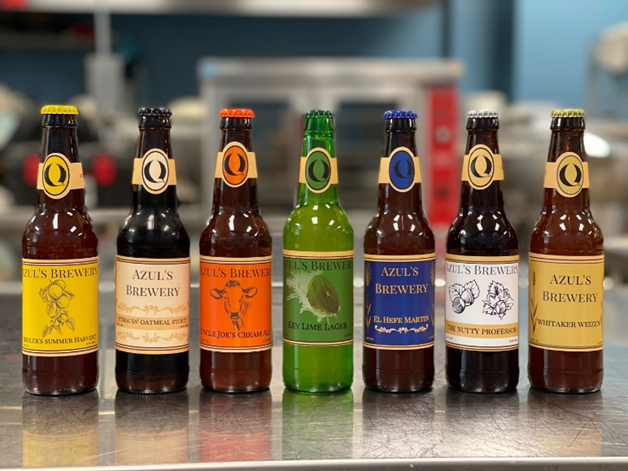“Cold beer, here! Get your ice-cold beer at Azul’s Brewery!”
Florida Gulf Coast University’s nano-brewery featuring beers created by students is now fully operational, and a formal brewing program is in development. The program will feature courses and student-run brewing operations that will supply beverages for FGCU events. Professor John Reilly, Ph.D., is leading the project after stepping in for retired professor Joseph Kakareka.

“You have to just sit back sometimes and just think ‘Wow, we did build something like this,’” Reilly said.
Reilly was hired by FGCU 10 years ago to the Chemistry & Physics Department. Five years later, Kakareka asked Reilly to join him in brewing on campus. What started as the two professors brewing on Saturdays in the Sugden Hall kitchen has blossomed into a promising enterprise.
Azul’s Brewery now has six students brewing and three others handling the operation’s Instagram account (@azuls_brewery).
“He (Kakareka) was sort of that spark that got this going,” Reilly said. “He’s still going to have a presence in this program, even though he is retired now. He has one of those personalities that live with you for a long time.”
To commemorate Kakareka’s work, Reilly and his students named a beer “The Nutty Professor” in his honor.
The students’ work has not gone unnoticed, Reilly said; he believes that is what has gotten the brewery to where it is today.
“Any of the students who commit to it are really fantastic because you have to commit to at least three to four weeks just to get that beer out,” Reilly said. “Now, the beers are finally labeled, they look great, and all of a sudden it hits them. They say, ‘I made this, and now I’m going to give this to people and hopefully they like it’.”

Building this program had its share of challenges, but Reilly believes it’s on the right path following an official presentation and tasting at the Whitaker Welcome Back Event in September.
“Now we’re starting to have fun with it, but there’s still a lot of work to build this program,” Reilly said. “It takes a while. It’s not like you get a big infusion of money and go and do it.”
Although it took a while to receive funding, the program received enough from FGCU’s Professional Development Fund Grant (PDFG) to purchase a 10-gallon pilot, industrial brewing station. The group brewed about 50 gallons of seven different beers for tasting.
From the sourness of the Key Lime Lager to the sweetness of the Strauss’ Oatmeal Stout, the program has a wide range of flavors for people to enjoy. The El Hefe Martin (named after FGCU President Mike Martin), Whitaker Weizen and Uncle Joe’s Cream Ale are some of the other flavors.
The brewery is currently developing more student recipes and dessert beers such as Salty Caramel and Creamsicle.
Juan Gamez and Rachel Burton are two students involved in the brewing process.
“It’s really exciting whenever we get to the end stages of brewing and we get to the bottling and labeling, like at the Whitaker event, seeing everyone open up the beer and enjoy it,” Gamez said. “It’s cool seeing people enjoy something that I helped make.”
Gamez, a senior biology major and Fort Myers native, plans on going into pharmacology but has enjoyed getting hands-on brewing experience. He credits his progression to the helpful hands of Burton and Reilly.

“Brewing is not a one-person thing. You need a collaborative group of people that work well with others to make it all work,” Gamez said. “We got lucky to have everybody work well with each other, and we’re all synchronized to make the brew day a little smoother.”
Burton, a spring 2021 graduate, was a chemistry major and physics minor. She worked with Reilly on his biochemistry research prior to joining the brew crew in summer 2019.
“To be a part of this has been empowering, challenging, fulfilling and a lot of fun. I knew when he asked me to come on board that we were in for a ride,” Burton said. “It has been really inspiring to watch it grow from when it was just him and Thomas to now being a real business venture for the university alongside a full-time interdisciplinary research program. I’m very proud to have been a part of this.”
The course format of the formal brewing program will be divided by a badge system. The system features four levels teaching students skills such as intermediate homebrewing and all-grain brewing HERMS (Heat Exchange Recirculating Mash System) system, the traditional way of making beer. The program is inclusive to students of all majors. After implementing the badge system, the program will submit proposals for a food science and fermentation minor.
“The open-mindedness of the university to have something like this on campus is something that a lot of students and future students will enjoy,” Gamez said. “Beer brewing just adds to the appeal of the campus for me.”
Reilly is trying to secure a brewpub license and expand the program to more FGCU events such as Octoberfest and athletic contests. He and his students are preparing a special beer for the 25th anniversary of FGCU next year.
Reilly wants the program to collaborate with other breweries and manage the speed of its expansion at the right pace. A nano-brewery produces on a much smaller scale than a microbrewery, which makes less than 15,000 beer barrels a year, according to most industry sources.
“Right now, all of the foundational stuff is there. The question is do you make it bigger and better?” Reilly said. “I think we should go bigger slowly. I don’t think that we go from 20 gallons to 150 gallons in one week. I think we should grow into the space.”
Reilly is hoping to have a pilot run of the full brewery program by fall 2022.
— Tyler Watkins is a senior journalism major who’s part of an internship program coordinated by University Marketing & Communications. FGCU students interested in learning about news and feature writing along with other aspects of public relations and marketing while earning internship credit hours should contact Keith Gibson at [email protected].